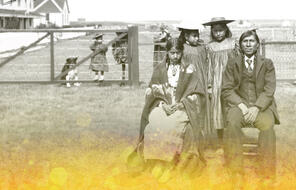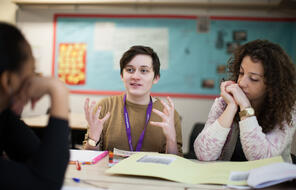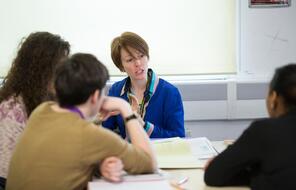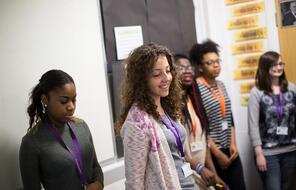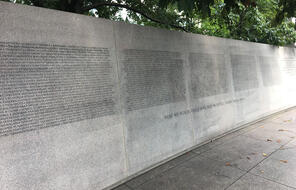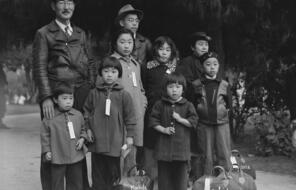Why Reconcile?
For years, survivors of the residential schools did not speak about their childhood experiences. Many factors contributed to their silence. The shame and stigma associated with violent and sexual abuse stopped many from speaking out. Moreover, many survivors could not find the words to describe their painful experiences in the Indian Residential Schools. 1
Laurel Wood, a community activist and artist working in the Ontario town of Sioux Lookout, described an encounter with a business associate who, upon meeting her, asked, “Don’t you think they should just get over it and stop asking for handouts? . . . People really suffered in Europe during the wars and look what they’ve been able to do. They just need to pick themselves up and get on with it.” Wood remembers being “completely taken aback.” She wondered, “How could I begin to describe the legacy of hopelessness and pain that followed a systematic attack on all First Nations people of our country, for hundreds of years? Where could I begin to summarize the unresolved and ongoing problems that First Nations people face on a daily basis?” 2
Wood was one of many who were not able to “just get over it.” Garnet Angeconeb is an Anishinaabe elder and a survivor of the Pelican Lake Indian Residential School. As part of his work with the Aboriginal Healing Foundation, Angeconeb discussed his long and painful journey and the positive effects of breaking the code of silence surrounding the residential school experience:
In my childhood . . . I was ripped away from my loving family. This caused a lot of painful confusion. Once inside the Indian Residential School system, I was afraid. I was lost. I was so lonesome. I felt betrayed. I felt abandoned. I was abused: physically, culturally, spiritually, mentally, emotionally, and yes, sexually.
After leaving the residential school, I became very angry. I was bitter. I was mad at myself. I was mad at my parents. I was mad at the government and at the churches. I was angry at my Creator. I was mad at the world. At the time there was an unwritten code of silence. Nobody talked about their negative experiences and bad memories of the residential school. . . . [Many years later in] 1992, I sat face-to-face with the man who had abused me, a man who had caused so much misery in my life and in my community. I challenged him to own up to his actions. . . . After the face-to-face meeting had ended in total denial, I felt so alone again.
I also experienced denial from some members of my family and community. There was silence from the government. The church didn’t know how to respond to my allegation of abuse. Sadly, there was silence from my own leaders. I know now that the issue was likely too overwhelming—too painful—for them to deal with . . .
In the fall of 1993, the Ontario Provincial Police had launched a full investigation into the allegations of abuse. . . . The man continued to deny all charges. Initially, he pleaded ‘not guilty’ to all charges. . . . Between the police investigation and the legal wrangling, my life had turned for the worse. I was drinking a lot. My marriage was failing. I was angry. It seemed that life had become unbearable. I had dragged my family into a living hell . . .
[Finally] in January 1996, our abuser was convicted. He was sentenced to four years in prison. . . . In the fall of 2001, I made overtures to church officials. I had one goal in mind—that was to meet my abuser to begin dialogue that would hopefully lead to the spirit of forgiveness. I thought if nothing else, I wanted to shake his hand.
Such was not to be. I was told that he had passed away the year before. The news hit hard. I felt sad. I asked myself—how do I forgive someone who has passed away? So in the spring of 2002, at a healing gathering, I found the courage to speak to the spirit of my abuser. In front of my immediate family and other witnesses, I spoke words of forgiveness. At that moment, I felt a heavy burden had been lifted. Somehow I felt my spirit was at ease. It is in setting ourselves free from our burdens—whatever they may be—that we must engage in good conversation. As citizens of this country, we must be engaged in meaningful dialogue. We can no longer be afraid to talk to each other. We shouldn’t have to settle our differences in the courts. We can no longer speak to each other through the media. 3
Darlene Auger, Truth and Reconciliation Commission Regional Liaison for Alberta, explained the importance of speaking about and sharing the Indian Residential Schools experience in the following way:
It is healing when you begin to talk about it because it becomes real, and you put it out in front of you and you can look at it. You separate yourself, you begin to separate yourself from it. You are not your pain. You are a beautiful, wonderful spirit, beautiful, wonderful human being that has had a really bad experience perhaps, a really painful experience. But it is not what you are all about. And so, to talk about it, to share it, and even more, to record it, to create a permanent record of it, so that the future generations can hear it, can see you, that’s even more profound. 4
- 1Legal scholar and anthropologist Ronald Niezen quotes a British Columbia judge who said, “One is drawn to the conclusion that the unspeakable acts which were perpetrated on these young children were just that: at that time they were for the most part not spoken of.” See Ronald Niezen, Truth and Indignation: Canada’s Truth and Reconciliation Commission on Indian Residential Schools (University of Toronto Press, 2013), Kindle Locations 1514–1518.
- First NationsFirst Nations: First Nations have lived in North America for tens of thousands of years. Today, the term refers to some 617 different communities, traditionally composed of groups of 400 or so. These nations enjoy a richness and diversity of identity, culture, and customs. Many view North America as their traditional homeland and do not recognize aspects of US and Canadian sovereignty. Alongside the Métis and Inuit Peoples, First Nations are part of a larger grouping officially called the Aboriginal Peoples of Canada.
- 2Jennifer Morrow, “Starting to Talk: A Guide for Communities on Healing and Reconciliation from the Legacy of Indian Residential Schools” (The Sioux Lookout Community Coalition for Healing and Reconciliation).
- 3 Aboriginal Healing Foundation website. Reproduced by permission of Aboriginal Healing Foundation.
- 4Ronald Niezen, Truth and Indignation: Canada’s Truth and Reconciliation Commission on Indian Residential Schools (University of Toronto Press, 2013).
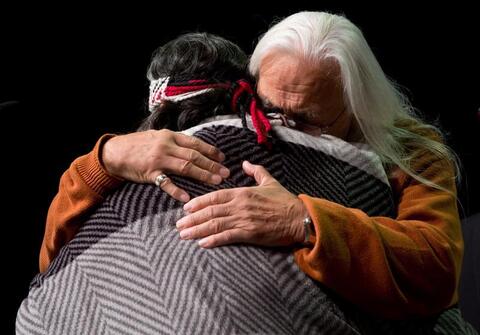
Connection Questions
- According to Laurel Wood, why is it that many former students of the residential schools can’t “just get over” the experience? What does it mean when someone says “just get over it”? Have you ever been told to get over it? How did this make you feel?
- Garnet Angeconeb talks about an “unwritten code of silence” surrounding the experience in the residential schools. What does he mean by that? Why does he think it’s important to break that code of silence?
- What is forgiveness? What does it mean when groups—not individuals—are involved?
- Angeconeb also says that “as citizens of this country, we must be engaged in meaningful dialogue.” What could such dialogue look like? What would it involve?
- Darlene Auger says that “it is healing when you begin to talk about it.” What does she mean by this? Do you agree with her? How does she define healing?
How to Cite This Reading
Facing History & Ourselves, "Why Reconcile?," last updated October 16, 2019.



